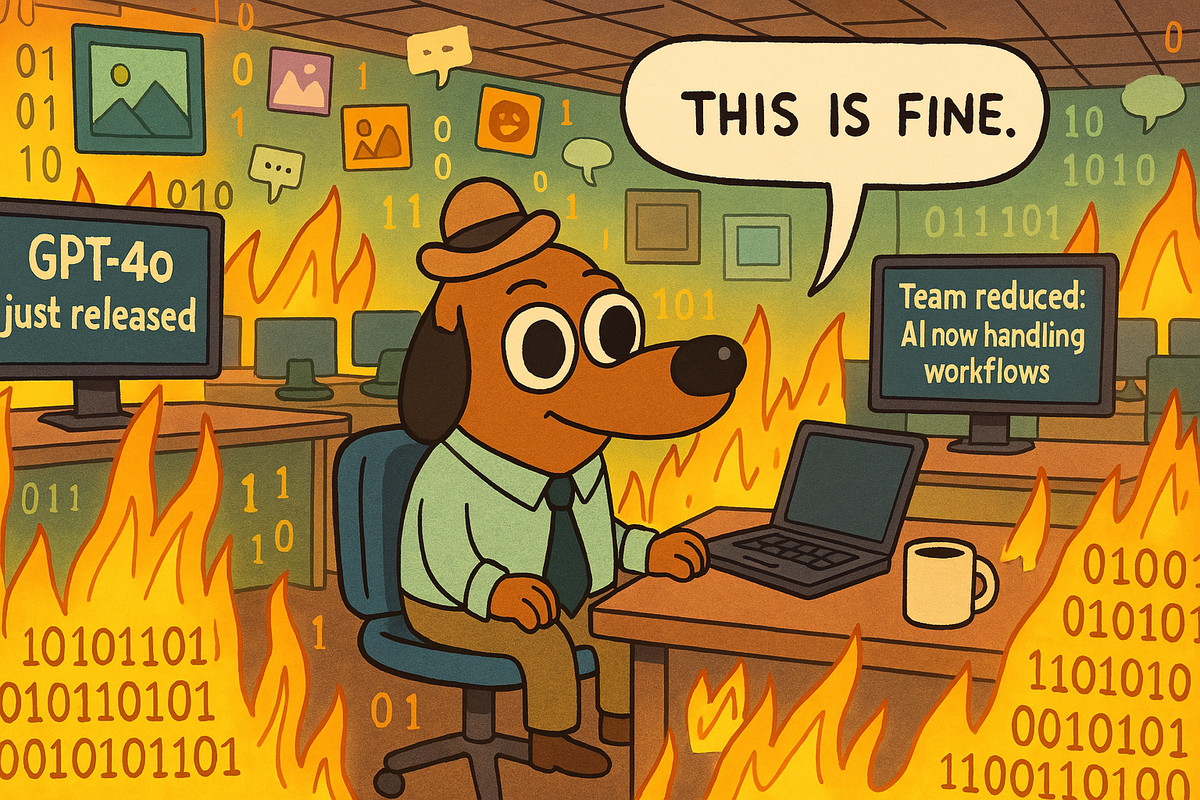The AI Reckoning Is Here: Our Careers and Companies Need an Immediate Reset
AI is transforming work from team execution to individual AI orchestration. This shift arrives in sudden leaps with each model update, not gradually. Adapt immediately by mastering these tools, or risk being left behind as companies restructure and traditional roles disappear.

The comfortable narrative that "AI won't take your job, people who use AI will" has been circulating for a while. I've even written that post myself. But it's time for some hard truth: AI absolutely will reshape our job landscape fundamentally and existing jobs will be going away.
OpenAI's update to their GPT-4o model last week really drove this home for me. For some reason, tweaking emails and documents, building applications and landing pages didn't fully crystallize the impact previously. Those improvements are magical, but they also seemed incremental somehow. But when I saw GPT-4o completely eliminate the need for product photoshoots by generating those images instead, reality hit hard. At the higher end, of course that work will still be done, but nothing that appears on a Shopify store will ever be captured again with any camera that isn't also used to scroll Instagram.
From Teams to Orchestrators: The New Work Reality
No, AI won't eliminate entire job functions overnight. What's changing is the scale and operational structure we've relied on for decades. Instead of teams executing work, we'll have individuals orchestrating AI systems that generate the output. This shift will dramatically transform our employment dynamics and organizational structures.
Recent research confirms this trajectory. A 2025 study from Harvard's Digital Data Design Institute involving 776 professionals at Procter & Gamble found that individuals working with AI performed just as well as two-person teams without AI (Mollick et al., 2025). The study documented a 0.37 standard deviation improvement in performance for individuals using AI over those working alone without it. These AI-equipped individuals also completed tasks 12-16% faster while producing more detailed solutions.
This transformation is inevitable, and we need to face it head-on. Many people are whistling past the graveyard when it comes to AI's impact. The productivity gains span coding, content creation, research, communications, and now media production including both images and video.
Corporate Survival Requires a Startup Mindset
These productivity leaps will allow companies to do more with less. Small resource-strapped teams can suddenly operate like they have additional staff. Existing teams can maintain or improve output with fewer people. Large corporations face an existential reckoning about their mission and future.
Welcome to the hustle era. Established companies will need to adopt startup mentalities because their optimization-focused approaches won't cut it anymore. They must completely reinvent their workflows and processes. Many will need to return to first principles, reassessing how to solve customer problems and build competitive businesses in this new landscape. And remember, the technology isn't standing still while we adapt. You need to constantly track what OpenAI, Anthropic, DeepSeek, and Google might release next week that could upend your entire industry. Every organization now requires internal or external resources dedicated to assessing when Sam Altman's latest tweet signals a seismic opportunity or threat to their business model.
Your Career Crossroads: Adapt or Be Left Behind
If your primary job function is shuffling around bits and bytes and you aren't actively preparing for this AI shift, I'm genuinely concerned. Without overstating it, we're headed for a workforce environment where people will be scrambling over each other for remaining opportunities.
Your only viable paths forward? Either master these tools to become significantly more effective than your peers, becoming the last person standing who orchestrates the AI agents at your company, or become an entrepreneur wielding AI as your advantage. Both paths lead through AI. If your company has banned these tools, you should be using them anyway (discreetly) and likely looking for other opportunities. That company is wrong and will be proven so. When the realization hits, many good soldiers who just followed the rules will be laid off during the inevitable course correction, or perhaps the business will simply collapse. Your market value depends on having developed these skills before that happens.
If you're currently at a company investing in AI upskilling, that's fortunate. Embrace it fully. If you're unemployed, learning these tools should be your absolute priority. Nothing is more urgent or clearer than this directive.
The Entrepreneurial Silver Lining
The silver lining? This disruption will likely fuel unprecedented entrepreneurship. When teams get downsized, those displaced workers can now, and perhaps will have to, band together and compete with their former employers in ways previously impossible. They can even hyper-serve smaller, lucrative opportunities that fly beneath the radar of existing companies.
Execution has become cheap. Building apps, writing documents, performing data analysis—all drastically simpler now. This upends the old "ideas versus execution" debate. Previously, we thought ideas were cheap and execution was everything. Now we see the real differentiator is deciding what to execute on and how to approach it. That's what separates the successful from those wandering aimlessly. We all need to develop that crucial taste, the ability to distinguish between what's worthwhile and what's not. As jobs change, work structures transform, and industry dynamics shift, this discernment appears to be our future's most valuable currency.
Just as GPT-4o instantly transformed product photography from a specialized skill to a prompt-driven task, AI is rapidly reshaping countless other professions. The future isn't approaching gradually. It's arriving in sudden, disruptive leaps with each model update and capability breakthrough.
Please. Tell me I'm wrong.